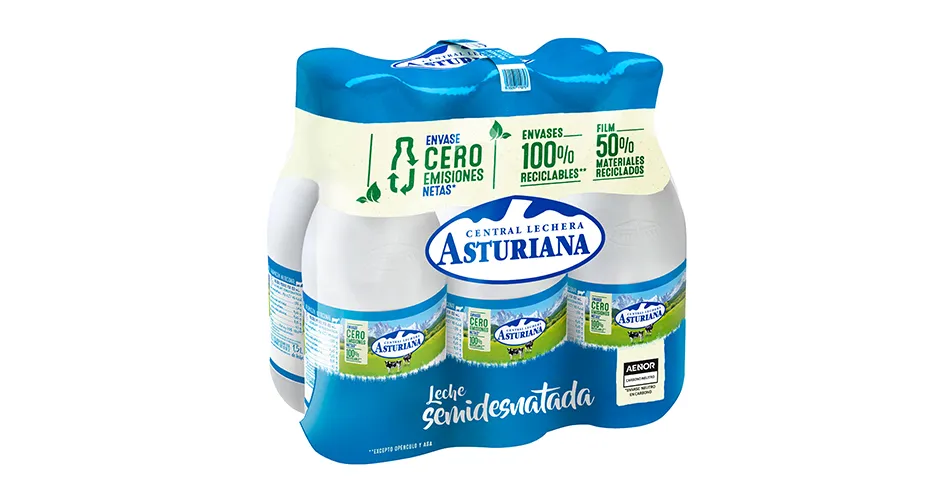- The dairy brand has calculated the carbon footprint of bottle packaging which includes all of its elements (primary, secondary and tertiary).
- It also continues to work on the eco-design of its packaging to ensure that it is 100% recycle, using fewer resources and/or including more sustainable materials.
- This is the first carbon neutral product to be certified by AENOR.
Central Lechera Asturiana maintains its support for protecting and looking after the environment by reducing the impact of its packaging and making a commitment to offset any emissions which cannot be avoided. It therefore launches the first net-zero emissions bottle onto the market, with the AENOR Carbon Neutral Packaging certificate.
The dairy brand continues to take various actions in order to achieve its goal of giving farming partners a future by offering natural products and solutions which improve the quality of life and give rise to healthier conditions for individuals in a sustainable environment.
Central Lechera Asturiana, within its environmental strategy, strives to be part of the solution to bring about this sustainable environment, making the planet a healthier place while also accomplishing the UN SDGs.
It aims to use the circular economy as a model in order to achieve climate neutrality in its entire value chain by 2035. This means that processes are optimised in order to reduce resources and turn waste into valuable materials.
CO2 Net-zero Emissions Packaging
In order to launch the first CO2 net-zero emissions bottle certified by AENOR onto the market, the dairy brand has calculated the carbon footprint of packaging in line with the GHG Protocol standards, including all its elements (primary, secondary and tertiary) with a “cradle-to-gate” scope: (from raw material extraction up to the point at which the product leaves the factory).
Furthermore, it has introduced a series of measures and worked with its suppliers in order to reduce the carbon footprint of packaging, by incorporating renewable energies, more efficient technologies and more sustainable materials in its processes and products.
Given that climate change is not a local problem, as part of its commitment to carbon neutrality, any emissions which may not be reduced with current technology have been offset through investment in projects which promote renewable energies that help to cut emissions in developing countries.
Eco-design of packaging
In light of the above, Central Lechera Asturiana continues to work on the eco-design of its packaging to make it 100% recyclable, use fewer resources and/or to ensure it contains more sustainable materials, resulting in its bottle being 100% recyclable.
It also uses recycled materials, where permitted according to food safety, meaning all the film used to group products together contains 50% recycled plastic.
Central Lechera Asturiana achievements in 2020
Last year the company was successful in becoming the first company to have a certified circular economy strategy, the first dairy company to have zero waste in all its factories and the first Spanish company to be carbon neutral in all its factories (scope 1 +2) certified by AENOR in these three fields.
As a result of this and alongside its cooperative business model, which is supported in its Integral Sustainability Plan, June 2020 also saw it become the first Spanish dairy company to receive the B Corp Certification for meeting the highest standards of social and environmental impact through the performance of its work.

Other initiatives
In May of this year, Central Lechera Asturiana launched its new plant-based milk cartons, meaning that the plastic cap and the plastic part of the layers which guarantee milk preservation is of plant origin, made of sugar cane.
100% of the cardboard used in the cartons comes from sustainable sources and is accredited by FSC, indicating that it comes from sustainable forests, is managed in order to protect the biodiversity, profitability and well-being of the local communities involved in its production and maintenance.
All of the above is defined in the Integral Sustainability Plan of the company, which sets the environmental goal of reaching carbon neutrality from farm to table by 2035.





